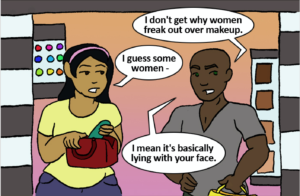
A stressed out person with their elbows on a desk and hands on their temples. Source: BET
Maybe you’re in one or you used to be. Maybe you’ve heard stories from friends or family. Maybe you’re looking to work for a nonprofit, one that works on feminist or other social justice issues, and you’re thinking this will be right kind of job for you. And it may be.
The work being done at feminist nonprofits and other organizations working for the kind of social change we discuss on Everyday Feminism is good and necessary work – and it can be very satisfying work as well.
Unfortunately, as many idealistic activists have found, too many of these organizations have dysfunctional, toxic work environments.
Do you think you might be working at an organization like this?
You might be.
Steph Herold, over at AbortionGang, wrote a fantastic article several years ago about toxic workplace environments in feminist organizations, which really hit home to me at the time. She made a really helpful list of clues that you may be working at a dysfunctional social justice organization:
- You’re expected to treat your members/patients/donors better than the way your boss/upper management treats you.
- You’re afraid to confront your co-worker/boss about something racist/classist/transphobic/etc. she said for fear of losing your job.
- You don’t get insurance coverage. The insurance coverage you get doesn’t cover pre-natal care, contraception, or abortion. You don’t get decent maternity or paternity leave. Yet these are all values your organization supposedly champions.
- There is frequent turn over and burn-out because of low pay and high stress.
- Your volunteers, interns, or anyone with “assistant” in their title are treated as a commodity.
- Young people, people of color, and/or queer folks are not valued, are not expected to be leaders, and are tokenized.
- When you give thoughtful feedback about your job or about the organization in general, no one takes you seriously.
- Your organization primarily works with or on behalf of low-income communities, communities of color, and/or young people, yet those folks are not represented on the staff or on the board. And there are no conversations about class, race, or privilege among staff. Ever.
- You see young people being encouraged to take on responsibilities for which they are not being paid, for the good of the organization and therefore the movement.
- You find yourself having to mask your work conditions — including poor communication, bad management, and unclear organizational goals — while selling your organization to donors and supporters.
- You are underpaid and are made to feel uncomfortable for any mention of that, or for requesting to be paid fairly, because times are tough/the economy is bad/you should be putting the organization’s needs before your own.
- Your organization only cares about marginalized people in a marginalized place (hello, low-income Texan women!) when your org stands to make a buck off of promoting their rough situation.
These and more exist in our movement. And it can be very misleading.
Quite often, we go into these jobs, especially if it’s our first job, thinking that because this organization stands for fairness and justice and is doing work to combat inequality, they probably treat their employees with the same principles.
We see an organization of all women, and we think, surely, there will be an understanding of justice here. We’re all women, fighting for the same thing; we’ll unite in the battle against patriarchy!
Sadly, this is not the case.
I would add, too, that there is often a general understanding that if you don’t accept the way you’re being treated, you aren’t truly committed to the movement. And this is complete and utter bullshit.
You’re not a better activist because you work for free and can’t buy food. Being ignored doesn’t make you more dedicated to the cause. You deserve to be treated with respect regardless of the issues you’re working on. You deserve to be heard and valued and paid a fair wage.
Your wellbeing is just as important to the movement as the work you’re doing — because if it’s not sustainable, then you’ll burn out too quickly. And this movement needs you.
So what can you do if you’re working in a toxic social justice organization?
1. Try Not to Conflate Your Organization with the Issue
I’ve seen too many good feminists get burnt out in toxic feminist organizations and then stop doing feminist work altogether.
This is devastating – not only for them, but for the movement.
We need all the help we can get in our fight for justice, and we can’t afford to keep losing the talented and committed people who are tossed aside by these organizations.
2. Take Time for Self-Care
Another way to avoid burn-out if you’re working at an organization like this and you want to keep working there is to take time to care of yourself.
Find ways to let go and not attach your sense of self-worth to the way you’re being treated.
Recognize that you’re not the problem, they are, and find ways to feel appreciated and heard outside of your work.
3. Talk to Your Coworkers
These dysfunctional spaces are able to maintain and perpetuate themselves on a sense of isolation and alienation of employees from one other.
If those of us at “the bottom” are angry at one another, competing (for attention/money/value), and blaming each other for the terrible work environment in which we find ourselves every day, then we’re not going to get together to talk about how we’re all being treated poorly and what we can do about it.
This is a strategy historically and consistently utilized by upper management in non-profits and for-profits alike. And although it may not be employed on a conscious level, it certainly is a major part of keeping unjust power structures in place.
But it’s so important that we band together.
You may not like your coworkers, but they’re in this with you, and if you can connect and share how you’re feeling, you’ll feel more supported and be more likely to make change in your organization.
4. Stand Up to Those in Power
We’re social justice activists, so we know how important it is to stand up and call out those in power. But somehow it can be much harder to do in these interpersonal work settings.
Talking with your fellow coworkers and speaking with upper management together about what changes need to be made may make the whole process less daunting.
What’s exciting, too, is that we’re seeing more non-profit organizations unionize, which is incredibly important, though sadly difficult to do in some justice orgs despite their outward notions of “fair and just workplace conditions.”
Consider talking with your coworkers about unionizing or finding another way to make your feelings and needs heard to those who have the power to change it.
5. Maybe It’s Time to Quit
This may have been your dream job, and you may have had completely different ideas about how this would go for you when you first started. But it’s important to know when to end something, especially if it means keeping yourself going as an activist and as a generally decent human being.
These jobs can make you cynical and make you hate the issues that you’re working on. Avoid this by knowing when it’s time to just say no.
6. Find Ways to Heal
Part of the healing process may simply be having and sharing the knowledge that it’s not just you, and you’re not alone. Your experiences and feelings matter, and it’s important that you feel heard.
Find a way to vent and connect with others who have had similar situations.
Maybe that means blogging about it (Herold, in her post, says that you can send her your story, and she may publish it on AbortionGang). Maybe it just means talking about it with your friends and fellow coworkers. Regardless, find a way to let it out – because when you hold in that hurt, it only harms yourself and your ability to do good work.
On the note of sharing your stories, Herold, in her blog, notes that there is a very valid fear amongst us about “outing” these social justice organizations because it may give fodder to those who are against the issue you’re fighting for.
Anti-abortion organizations, for example, would be all too ready to jump on the fact that a well-known reproductive rights organization is dysfunctional. I would never want them to be able to use that against the abortion rights movement, and this is of course a concern.
But there is also a natural desire to call someone out, to have them be held accountable, and to let the world know – especially those who are giving them money – just how poorly they treat their employees.
You may be reading this and wondering, “Well how do I know if the job I’m applying for is like this?”
I certainly don’t want the take-away from this piece to be “Don’t ever work for a social justice organization.” Because there are certainly many good ones out there. But here are ways to get an idea while you’re still in the application process.
1. Do your research.
Look them up online, ask others in the movement about the org, and, if you can, contact others who have worked for that organization in the past.
2. Try to get a sense of the workplace dynamics if you’re asked to come in for an interview.
Sometimes, the way they treat you throughout the hiring process can be indicative of how they will treat you as an employee. Notice the small things, and ask questions during the interview about the workplace environment.
Ultimately, you may not really know until you begin working there.
***
Although it’s largely up to upper management to change things, we are not powerless. But we have to start by talking to each other, providing a structure of support for one another, and finding ways to heal during and after these jobs.
We also have to address the fact that this is not as simple as getting rid of a few bad apples. Ultimately, this problem is larger than that: It’s a societal problem, it’s structural, and it has a lot to the do with larger non-profit industrial complex, as well as our unjust economic system. But our movement can – and should – be better than this.
We have enough legislative and cultural attacks coming from outside of our movement, without dealing with the attacks from within.
Working for justice in a toxic world is stressful enough as it is. We need (and deserve!) spaces that are stable, creative, fair, and supportive if we are to create the kind of just world we’re fighting for.
[do_widget id=”text-101″]
Laura Kacere is a Contributing Writer for Everyday Feminism and is a feminist activist and organizer, clinic escort, grad school student, and yoga teacher living and going to school in Chicago. When she isn’t studying or on her mat, she’s usually thinking about zombies, playing music, eating Lebanese food, and wishing she was surrounded by trees. Follow her on Twitter @Feminist_Oryx.
Search our 3000+ articles!
Read our articles about:
Our online racial justice training
Used by hundreds of universities, non-profits, and businesses.
Click to learn more
Most Read Articles
- « Previous
- 1
- …
- 30
- 31
- 32



















